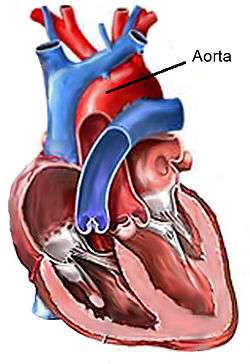Definify.com
Webster 1913 Edition
Aorta
A-or′ta
,Webster 1828 Edition
Aorta
AORT'A
,Definition 2026
Aorta
aorta
aorta
English
Noun
aorta (plural aortas or aortae)
- (anatomy) The great artery which carries the blood from the heart to all parts of the body except the lungs; the main trunk of the arterial system.
- (figuratively) The liveliest part of something.
Derived terms
Translations
|
|
See also
Asturian
Etymology
Borrowing from Ancient Greek ἀορτή (aortḗ, “the arteries springing from the heart”), from ἀορτέω (aortéō), lengthened form of ἀείρω (aeírō, “I lift, raise”).
Noun
aorta f (plural aortes)
Catalan
Etymology
Borrowing from Ancient Greek ἀορτή (aortḗ, “the arteries springing from the heart”), from ἀορτέω (aortéō), lengthened form of ἀείρω (aeírō, “I lift, raise”).
Noun
aorta f (plural aortes)
Related terms
Galician
Etymology
Borrowing from Ancient Greek ἀορτή (aortḗ, “the arteries springing from the heart”), from ἀορτέω (aortéō), lengthened form of ἀείρω (aeírō, “I lift, raise”).
Noun
aorta f (plural aortas)
Related terms
Irish
Etymology
Borrowing from Ancient Greek ἀορτή (aortḗ, “the arteries springing from the heart”), from ἀορτέω (aortéō), lengthened form of ἀείρω (aeírō, “I lift, raise”).
Noun
aorta m (genitive singular aorta, nominative plural aortaí)
Declension
Fourth declension
|
Bare forms
|
Forms with the definite article
|
Derived terms
- aorta droma (“dorsal aorta”)
- aorta tairr (“ventral aorta”)
- aortach (“aortic”, adjective)
Mutation
| Irish mutation | |||
|---|---|---|---|
| Radical | Eclipsis | with h-prothesis | with t-prothesis |
| aorta | n-aorta | haorta | t-aorta |
| Note: Some of these forms may be hypothetical. Not every possible mutated form of every word actually occurs. | |||
References
- "aorta" in Foclóir Gaeilge-Béarla, An Gúm, 1977, by Niall Ó Dónaill.
Italian
Etymology
Borrowing from Ancient Greek ἀορτή (aortḗ, “the arteries springing from the heart”), from ἀορτέω (aortéō), lengthened form of ἀείρω (aeírō, “I lift, raise”).
Noun
aorta f (plural aorte)
Derived terms
Anagrams
Latvian

Etymology
Via other European languages, ultimately a borrowing from Ancient Greek ἀορτή (aortḗ, “the arteries springing from the heart”), from ἀορτέω (aortéō), lengthened form of ἀείρω (aeírō, “I lift, raise”).
Pronunciation
Noun
aorta f (4th declension)
- (anatomy) aorta (the main artery of the circulatory system, responsible for carrying the blood from the heart to the rest of the body except the lungs)
- lielais asinsriņķošanas loks sākas ar aortu ― the great blood circulation cycle begins with the aorta
- lielie asinsvadi: aorta un plaušu artērija ― the major blood vessels: the aorta and the pulmonary artery
Declension
Polish
Etymology
Borrowing from Ancient Greek ἀορτή (aortḗ, “the arteries springing from the heart”), from ἀορτέω (aortéō), lengthened form of ἀείρω (aeírō, “I lift, raise”).
Pronunciation
- IPA(key): [aˈɔrta]
Noun
aorta f
Declension
Portuguese
Etymology
Borrowing from Ancient Greek ἀορτή (aortḗ, “the arteries springing from the heart”), from ἀορτέω (aortéō), lengthened form of ἀείρω (aeírō, “I lift, raise”).
Noun
aorta f (plural aortas)
Serbo-Croatian
Etymology
Borrowing from Ancient Greek ἀορτή (aortḗ, “the arteries springing from the heart”), from ἀορτέω (aortéō), lengthened form of ἀείρω (aeírō, “I lift, raise”).
Pronunciation
- IPA(key): /ǎoːrta/
- Hyphenation: a‧or‧ta
Noun
àōrta f (Cyrillic spelling а̀о̄рта)
Declension
Spanish
Etymology
Borrowing from Ancient Greek ἀορτή (aortḗ, “the arteries springing from the heart”), from ἀορτέω (aortéō), lengthened form of ἀείρω (aeírō, “I lift, raise”).
Pronunciation
- IPA(key): /a.ˈoɾ.ta/
Noun
aorta f (plural aortas)
Derived terms
Swedish
Etymology
Borrowing from Ancient Greek ἀορτή (aortḗ, “the arteries springing from the heart”), from ἀορτέω (aortéō), lengthened form of ἀείρω (aeírō, “I lift, raise”).
Noun
aorta c
Declension
| Inflection of aorta | ||||
|---|---|---|---|---|
| Singular | Plural | |||
| Indefinite | Definite | Indefinite | Definite | |
| Nominative | aorta | aortan | aortor | aortorna |
| Genitive | aortas | aortans | aortors | aortornas |